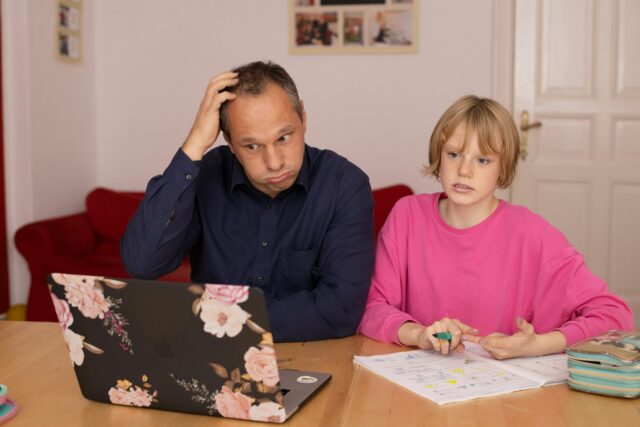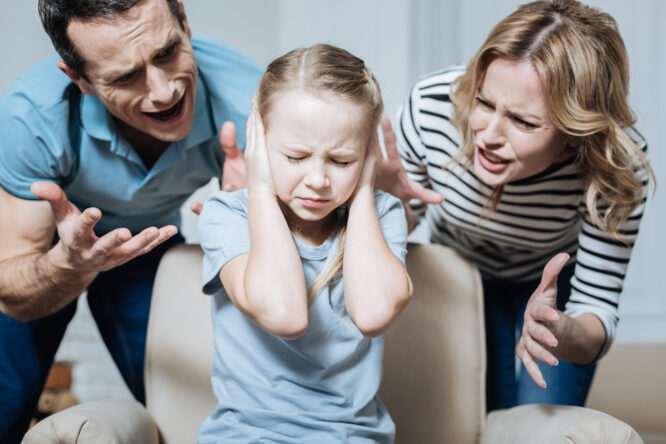Being a parent isn’t easy, and sometimes words slip out that you later regret.

That being said, some phrases cut deeper than others, especially when they come from the people who raised you. If you’re the parent of adult children, it’s important to be mindful of the words you use — and these are ones you definitely shouldn’t.
1. “I wish you were more like…”

Comparing your child to someone else, whether it’s a sibling, friend, or even a fictional character, can make them feel inadequate and unloved. It sends the message that they’re not good enough as they are, and that you value someone else’s traits or achievements more than their own.
2. “You’ll never amount to anything.”

This kind of statement is incredibly damaging and can shatter a person’s confidence. It dismisses their potential, invalidates their efforts, and makes them feel like they’re destined for failure. Even if said in frustration or jest, it can leave a lasting scar.
3. “I’m disappointed in you.”

While expressing disappointment can sometimes be a way to motivate or encourage change, it’s important to do so with compassion and understanding. Focusing on specific actions or behaviours, rather than the person as a whole, can be more constructive. It’s important to remember that your child is still learning and growing, and your support can be crucial in their development.
4. “You’re just like your father/mother.”

Using comparisons to the other parent as a negative criticism can be hurtful and unfair. It implies that your child has inherited undesirable traits and is destined to repeat the same mistakes. This kind of statement can also create tension and resentment within the family, as it puts the blame on one parent for the child’s perceived shortcomings.
5. “I never should have had you.”

This is perhaps one of the most hurtful things a parent can say. It implies that the child was a mistake, an unwanted burden, and a source of regret. It can leave a deep sense of insecurity and unworthiness, making it difficult for the child to form healthy relationships and believe in their own value.
6. “I’ve done so much for you, and this is how you repay me?”

Guilt-tripping your adult child by reminding them of all you’ve done for them can be manipulative and damaging. It creates a sense of indebtedness and obligation, making them feel like they can never truly repay your sacrifices. This can lead to resentment and damage the parent-child relationship.
7. “You’re so selfish.”

Labelling your child as selfish can be a harsh judgement that ignores their unique circumstances and experiences. It’s important to understand their perspective and try to see things from their point of view. Instead of making a blanket statement, try to address specific behaviours that might seem selfish and have an open conversation about them.
8. “Why can’t you be more like your siblings/friends?”

Comparing your child to their siblings or friends can create a sense of competition and resentment. It makes them feel like they’re not good enough and that you value other people more than them. Instead of focusing on what they lack, try to celebrate their unique qualities and strengths.
9. “You’re such a disappointment.”
 Source: Unsplash
Source: Unsplash This sweeping statement can be incredibly demoralising and destroy your child’s self-esteem. It implies that they’ve failed to meet your expectations in a fundamental way and that you no longer believe in their potential. This can lead to feelings of shame, guilt, and inadequacy, making it difficult for them to move forward and pursue their goals.
10. “I don’t like your partner/friends.”
 Source: Unsplash
Source: Unsplash While you might have valid concerns about your child’s partner or friends, expressing them in a disrespectful or dismissive way can damage your relationship with your child. It’s important to communicate your concerns in a way that’s respectful and open to dialogue. Remember that your child is ultimately responsible for their own choices, and your role is to offer guidance and support, not dictate their relationships.
11. “You’re too sensitive.”

Dismissing your child’s feelings as “too sensitive” can invalidate their emotions and make them feel like their experiences aren’t valid. It’s important to acknowledge and validate their feelings, even if you don’t fully understand them. Try to offer empathy and support, rather than minimising or dismissing their emotions.
12. “I regret having children.”

This statement is deeply hurtful and can make your child feel unwanted and unloved. It implies that their existence is a burden and a source of regret, which can leave a lasting scar on their emotional well-being. It’s important to remember that your words have power, and this kind of statement can be incredibly damaging.
13. “You were an accident.”

This is another hurtful phrase that can make your child feel like their existence was a mistake. It can lead to feelings of insecurity, unworthiness, and rejection. It’s important to remember that every child deserves to feel loved and wanted, regardless of the circumstances of their conception.
14. “I don’t care what you do with your life.”

While your adult child is ultimately responsible for their own life choices, expressing indifference or apathy towards their goals and aspirations can be hurtful. It can make them feel like you don’t care about their happiness or success. Even if you don’t agree with their choices, it’s important to show them that you support and believe in them.
15. “You’ll never be good enough.”

This statement is a direct attack on your child’s self-esteem and can have a devastating impact on their confidence. It implies that they’re inherently flawed and incapable of meeting your expectations. This can lead to feelings of hopelessness, inadequacy, and self-doubt.
16. “I’m ashamed of you.”

Expressing shame towards your child can be incredibly damaging and can make them feel like they’ve let you down in a fundamental way. It can harm their self-esteem and make it difficult for them to feel proud of themselves or their accomplishments.
17. “You’re a failure.”

Labelling your child as a failure is a harsh judgement that ignores their strengths and potential. It can make them feel like they’re not good enough and that they’ll never be able to achieve anything meaningful in their life. This kind of statement can be incredibly demoralising and can have a lasting negative impact on their well-being.




